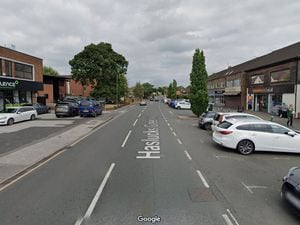Father of knife victim James Brindley backs new violent crime unit
A new police team set up to tackle violent crime has been backed by a father whose son was stabbed to death by a stranger.

Mark Brindley, whose son James was attacked while walking home in Aldridge in 2017, called the Violence Reduction Unit a “turning point” in the fight against crime.
The £4 million project will roll out across the West Midlands in a bid to tackle the rapid rise in gun and knife crime on the region’s streets.
More coverage:
James Brindley, a fitness instructor, was killed by a 17-year-old who stabbed him through the heart on June 23, 2017.
And his father, who spoke at the launch of the project, said the key to tackling such crimes was prevention.
Mr Brindley said: “We’re here because of people like James, who was attacked and stabbed through the heart and died close to the scene and the fall-out of his family, friends and our local community as a result of that.
“We’re all here to prevent that from happening as quickly as we possibly can do in future.

“We hear family members speaking about the utter devastation – and I absolutely agree with that word – but I would use a metaphor.
“I’m minded of scientists talking about an asteroid hitting the Earth however many thousands of years ago and wiping out life. That’s how it is.
“After time new life emerges but it’s a different life-form, but the life that once was will never return.”
Mr Brindley said he remembered seeing a “sea of blue lights” flashing everywhere at the scene and, along with his wife and daughter, seeing James undergo open heart surgery before being asked to stand back.
“We were helpless and didn’t know what to do with ourselves. Those moments in time just play out in our heads every day.
"We get up in the morning and it’s the first thing we think about, and when we go to bed it’s the last thing we think about it – if we can sleep at all.”
Mr Brindley immediately set off to tell his wife Beverley’s parents, who lived close by, and his parents who are in their 90s.
“They were living with my sister – my father has Alzheimer’s and is 92 and my mother is 90.
“It was incredibly difficult and my father cried like a baby – and then he forgot,” he said.
Mr Brindley and his family still visit the scene of the stabbing every Friday to lay a candle and flowers, along with his friends and family – and is determined to raise awareness of knife crime through the James Brindley Foundation.

Police and Crime Commissioner for the West Midlands, David Jamieson said: “This is about more than words, it’s about actions and I hope we will all resolve to do more and think ‘what can I do?’ to help.
“Most certainly we have a problem and we have seen it manifest throughout the West Midlands and in the country in the last two to three years.
"It’s the intervention work which needs to be done so young people can find their way down a successful path.”
Wolverhampton Council leader Councillor Ian Brookfield, also speaking at the launch, said: “This is important to Wolverhampton and the West Midlands.
"We’ve made youth a major plan going forward and if we can put on a distraction, we’re sure it can bring down crime. This initiative is going to be a game changer.”
The project will follow in the footsteps of the Scottish Violence Reduction unit, which has seen the number of murders cut down from 137 to an average of 60 since it was introduced.
It aims to focus on prevention and will bring together police with health professionals, schools, youth workers and local authorities.
Experts will be based in GP surgeries to help domestic violence victims, there will be a roll-out of violence prevention programmes in schools, and increased support to prevent prisoners from re-offending on release.





